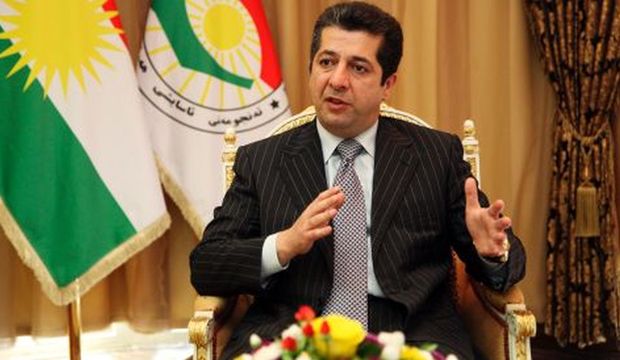
Masrour Barzani, head of the Kurdish region’s National Security Council, speaks during an interview with Reuters in Erbil, in Iraq’s Kurdistan region, July 19, 2014. (Reuters)
Erbil, Asharq Al-Awsat—Kurdish Peshmerga forces continue to advance and recapture territory held by the Islamic State of Iraq and Syria (ISIS) in the north of the country, Chancellor of the Kurdistan Region Security Council Masrour Barzani told Asharq Al-Awsat.
“The situation on the battlefront is good. Peshmerga forces have been able to regain control of the majority of areas that had been under ISIS control. The morale of the Peshmerga forces is high, and we have been able to overcome all the problems that we faced in the beginning,” Barzani said.
“We cannot say that ISIS has [now] lost their offensive capabilities, but we can say that this has been greatly reduced,” he added.
Barzani, a member of the Kurdistan Democratic Party (KDP) and son of Kurdish President Massoud Barzani, hailed the Peshmerga forces’ advance, but stressed that both the international community and the Iraqi government must do more to arm and train the Kurdish fighters.
“We have told the international forces that there is a continuous need to supply the Peshmerga forces with sophisticated arms in order to repel the [ISIS] enemies and defeat them as quickly as possible. The arms that the Peshmerga have today are the old arms that came from the former Iraqi army,” he told Asharq Al-Awsat.
“As for the military assistance that reached the Kurdish region, this comprises medium weaponry and ammunition. The only heavy weaponry that we have yet received is some anti-tank missiles supplied by Germany. So the Kurdish region has yet to receive any other weapons that will allow us to change the balance of power on the ground in favor of the Peshmerga,” he added.
Barzani particularly criticized Iraqi military assistance to Kurdish forces, which he said was practically non-existent.
“Baghdad should have provided far more [military assistance] than it has. Baghdad should have provided the Peshmerga forces with sophisticated weaponry . . .But we have seen nothing like this,” he said.
He added that the western states who have pledged military assistance to the Peshmerga have yet to meet these promises, calling on the international community to do more as ISIS “is not waiting for us to be armed to attack us.”
In a broad-ranging interview with Asharq Al-Awsat, Barzani said that the Kurdistan Region Security Council—which he heads—is doing everything in its power to preserve Kurdish security and stability in coordination with other political and security apparatus within the Kurdistan Region Government (KRG).
“In light of the [security] deterioration across the Middle East, we believe that the Kurdistan Region has become a model for stability, not just in the region but globally. The Kurdistan Region Security Council has played a prominent role in providing security and stability [in the region] as it directly oversees all institutions related to security and stability in the region,” Barzani said.
He claimed that the Council is a “prime contributor” to the Peshmerga forces and its fight against ISIS, while it also provides and coordinates intelligence and information between the various branches of the Kurdish military.
The Kurdish efforts to liberate territory from ISIS are just the first stage in a major military operation, the KDP official said.
“The objective is not just to liberate [ISIS] territory but to allow the people who fled to return to their homes. We have not liberated a lot of territory, but the people cannot return there because they will be targets for ISIS,” he said, “so this is a prolonged operation that will continue until we have liberated Mosul and all other areas from ISIS.”
“In Kurdistan and the border region, there is no political sensitivity with Kurdish Peshmerga forces entering the fight and liberating these others. As for other Arab-majority areas, we do not want to give the impression that the Peshmerga forces are trying to increase [Kurdish] territory,” Barzani claimed.
“We want to liberate all Kurdish territory [from ISIS] and to participate in the liberation of all other areas [of Iraq]. But the Peshmerga forces cannot do this alone, there must be joint operations [with Iraqi forces]. The Iraqi army must player a greater role [in fighting ISIS] than it has until now.”

I, as an American am proud of what the Kurdish people have overcome. Unfortunately the Iraqi government and the international community do not want to arm, train and help organize any kurdish army. Sadly they see Kurds if united, a force to recon with not only militarily but politically as well. I for one support an independent Kurdistan free of Iraqi, Turkish and Syrian rule. You have proved time and again the willingness to stand up for your people and your beliefs and time again have been brushed aside. The Shia and Sunni should look upon your people as an examle of perseverance. I applaud how the Kurdish people have repeatedly stood their ground and even facing adversity have offered to help the other territories with liberation. I implore our international community to “step up” and recognize these people and meet your obligations of support. Thanks to you Kurdish people, there are few of us who stand and recognize your struggles. Keep up the good fight!